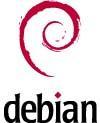CeBIT Open Source Project Lounge -- Debian GNU/Linux
Debian -- the free Linux distribution
ByDebian is among the 15 projects that will present their work at CeBIT, offering a free Linux operating system Java-written platform for knowledge management.

In a nutshell: How would you describe your project in one or two sentences?
GNU/Linux distribution with a HUGE software volume. Easy to use and maintain.
When did the project begin?
1993.
How many active members does the project have?
Core developers: around 1,000. Otherwise engaged: countless others.
How did the project come into being?
At the time Debian was created the whole concept of a Linux "distribution" was a new one. So with Debian, Ian Murdock aimed for an open distribution along the model of Linux and GNU. Debian was to be carefully and faithfully crafted and maintained and attended to with equal care. The project began as a small, tight community of free software hackers and grew step by step to a large, well organized association of developers and users.
Why should a CeBIT visitor come to your booth?
For example, to experience the brand new Debian GNU/Linux 5.0 "Lenny," our most current stable version that will be completed in February, inclusive of an expanded, reworked installation system, a slew of internal improvements (such as dpkg-Trigger), a broad support of hardware architectures from embedded systems in routers through desktop computers to large servers, and with a naturally huge volume of current software.
Who do you make your software for?
Debian is conceived as a universal platform and is, therefore, well suited for just about anyone. This is evident in its large software volume (over 20,000 software packages), versatility (from games and office software to server applications), support of hardware architectures (from routers and NAS devices, desktop computers with AMD and Intel CPUs, to SPARC- and S390-based servers).
Where do you see your biggest current challenge?
The tuning and stabilizing of single components under such a huge volume while still adhering to our quality guidelines. Of course, this affects any estimations of when a release will be ready and has a natural effect on motivation.
If you could hire a full-time project developer now, what problem should he or she be ready to solve?
Paying developers to work on certain aspects of the distribution was done in the past and not always positively welcomed. However, if we were to pay developers, generally the improvement in software quality would make it worth it and other projects might profit from it as well. Unfortunately, and despite all the work put in since the beginning of the project, a number of bugs have amassed that, for whatever reason (time, bigger restructuring, etc.), weren't able to be fixed.
Under which license is the software currently offered?
All software in the Debian "main" archive is free according to our free software guidelines, is essentially available in the source code, allows for modification and free distribution even in modified form, and has no restrictions as to use by any individuals or groups. Additional archives for distributable software don't fall under these criteria and have to be activated after installation.
Project Website: http://www.debian.org
Subscribe to our Linux Newsletters
Find Linux and Open Source Jobs
Subscribe to our ADMIN Newsletters
Support Our Work
Linux Magazine content is made possible with support from readers like you. Please consider contributing when you’ve found an article to be beneficial.

News
-
The Next Linux Kernel Turns 7.0
Linus Torvalds has announced that after Linux kernel 6.19, we'll finally reach the 7.0 iteration stage.
-
Linux From Scratch Drops SysVinit Support
LFS will no longer support SysVinit.
-
LibreOffice 26.2 Now Available
With new features, improvements, and bug fixes, LibreOffice 26.2 delivers a modern, polished office suite without compromise.
-
Linux Kernel Project Releases Project Continuity Document
What happens to Linux when there's no Linus? It's a question many of us have asked over the years, and it seems it's also on the minds of the Linux kernel project.
-
Mecha Systems Introduces Linux Handheld
Mecha Systems has revealed its Mecha Comet, a new handheld computer powered by – you guessed it – Linux.
-
MX Linux 25.1 Features Dual Init System ISO
The latest release of MX Linux caters to lovers of two different init systems and even offers instructions on how to transition.
-
Photoshop on Linux?
A developer has patched Wine so that it'll run specific versions of Photoshop that depend on Adobe Creative Cloud.
-
Linux Mint 22.3 Now Available with New Tools
Linux Mint 22.3 has been released with a pair of new tools for system admins and some pretty cool new features.
-
New Linux Malware Targets Cloud-Based Linux Installations
VoidLink, a new Linux malware, should be of real concern because of its stealth and customization.
-
Say Goodbye to Middle-Mouse Paste
Both Gnome and Firefox have proposed getting rid of a long-time favorite Linux feature.
